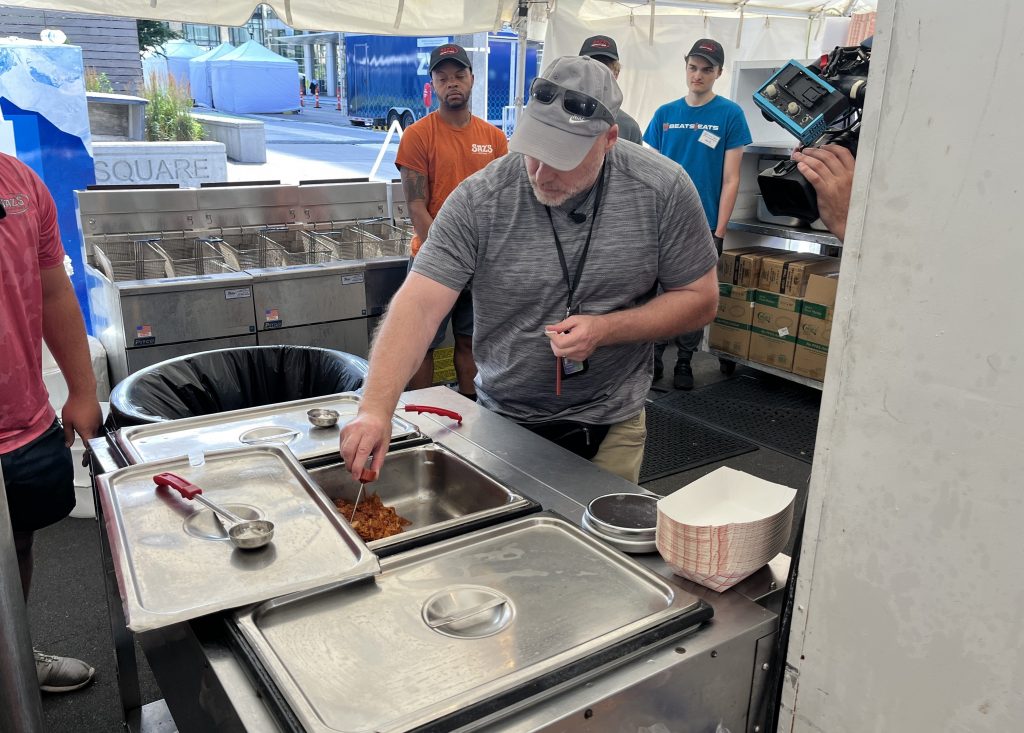How Milwaukee Inspects Festival Food Vendors
Health inspectors offer behind-the-scenes look at process during Bastille Days.

Mike Starks checks the temperature of a pan of chicken at Saz’s booth. Photo taken July 18, 2025 by Sophie Bolich.
Food and drink is flowing at Bastille Days, which kicked off July 17 at Cathedral Square Park. While hungry festival-goers are focused on flavor, price and finding the shortest line, the Milwaukee Health Department (MHD) has a different priority: safety.
Representatives from MHD’s Consumer Environmental Health (CEH) team were on-site Friday morning to complete inspections at Saz’s and Lupi & Iris — checking for handwashing, temperature maintenance, proper storage and more.
Festival veteran Saz’s was up first, welcoming Environmental Health Coordinator Mike Starks into its spacious booth.
Starks, with a sheathed thermometer around his neck and sanitizing wipes close at hand, examined the company’s license, tested the handwashing station and inspected both hot and cold foods.
“We’re looking for hot holding temperatures of at least a minimum of 135 [degrees Fahrenheit], and then we’re also looking for any food that’s in containers to be covered, making sure there’s nothing that can fall in — no insects, no debris, things like that,” Starks said.
Throughout the inspection, he also quizzed employees on best practices such as calibrating thermometers, storing raw meat and properly thawing products before cooking.
The inspection lasted approximately 22 minutes, and Saz’s passed with a score of 92, meaning Sampler Platters are on the menu tonight.
The booth will also offer sour cream and chive fries, mozzarella sticks, cheese curds, braised pulled pork sandwiches, BBQ pulled chicken sandwiches and chicken tenders, along with a selection of beverages.
“There’s always pressure when a health inspection comes,” said Casey Sazama-Schneck, operations director for Saz’s Hospitality Group, adding that he doesn’t take the matter lightly.
“We’ve been in business for almost 50 years now, which we’re super proud of, so it’s important for us to keep our reputation, and it’s important for us to get really good scores on our health inspections.”
Lupi & Iris, serving French-inspired dishes like marinated olives, pesto pasta salad and brie-laden sandwiches, also passed its inspection. One menu item was temporarily unavailable due to temperature issues, but staff quickly addressed the problem by bringing over a replacement from the restaurant’s main location at 777 N. Van Buren St.
“Because we can’t say with 100% certainty that this food is safe, unfortunately we have to discard it,” Starks said. “That’s one of the things that we least like about our job, you know, is tossing someone’s food or making them discard it, because they put a lot of time and money into it.”
Starks said the department is working to reduce these types of situations through ongoing education. Earlier this summer, the team hosted an in-person training — complete with a full-scale mock booth — to guide vendors through proper food safety practices. Staff also distributed a handbook for future reference.
Many vendors shared positive feedback, noting that it was helpful to see the steps in-action, rather than just hearing them, said CEH Director Carly Hegarty. “I know multiple [vendors] at Juneteenth said that made all the difference for them.”
Every vendor who acquires a Temporary Event Food Dealer License can expect at least one inspection annually. Hegarty said the department inspects more than 450 vendors each year.
At festivals, MHD aims to complete inspections early-on. “Anything that needs to be followed up on, we come back right away,” Hegarty said. “Then they’re good for the rest of the festival — and most of them, for the rest of the season.
For smaller issues, vendors are able to correct on-site and be re-inspected, if necessary. Cases of complete shutdown are relatively rare, and typically involve brand-new or unlicensed vendors, Hegarty said.
Throughout the remainder of Bastille Days and at future festivals, Hegarty urged consumers to feel empowered to ask questions before eating.
“Keep things in mind while you’re ordering your food,” she said. “Do you see a hand wash sink? Are employees wearing gloves? … It’s a good thing to have an eye open and pay attention to these things.”
Serious problems can be reported to the division through an online complaint portal or by calling (414) 286-3674.
“We’re pretty quick to turn around and check on those, and we certainly want to know about them,” Hegarty said. “Most of the time, it’s an education opportunity, right? It’s something that can be fixed.”

Existing members must be signed in to see the interactive map. Sign in.
If you think stories like this are important, become a member of Urban Milwaukee and help support real, independent journalism. Plus you get some cool added benefits.





















